Menu
FAQ: Earning Your Ed.D. in Educational Leadership Online

Earning a doctorate in any discipline is a major personal and professional achievement, but graduates with an Ed.D. in Educational Leadership are unique. Professionals in many different fields choose this Ed.D. degree to grow their knowledge of best practices in administration and management as well as organizational behavior.
Students develop their leadership skills while preparing for top roles in K-12 and higher education, business or nonprofit and government service. Ed.D. graduates are often sought after for their expertise in strategic analysis and change management. They also know how to help learners of all ages achieve the core competencies required to succeed in jobs of the future.
Earning your doctorate in educational leadership online gives you the flexibility to take classes at a comfortable pace while still working full time. Many online Ed.D. programs can also be completed faster than an equivalent degree on campus. Follow the links below to learn more.
What Is a Doctor of Education Degree?
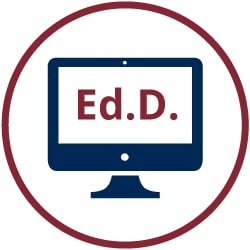
The Doctor of Education (Ed.D.) is a graduate degree for students who want to expand their professional options and grow as leaders. Coursework focuses on the ways leadership is defined and practiced in a variety of organizational settings, and how it influences decision-making. Students also learn how to navigate the relationships, conflicts and management issues common to every industry.
Ed.D. programs that highlight educational leadership prepare graduates for a wide range of roles in education and beyond, including classes directly applicable to corporate and public-service careers. In addition, students develop the communication, collaboration and project management skills that are essential for working with cross-functional teams.
St. Thomas University's online Ed.D. in Educational Leadership – Administration program features accelerated courses, convenient scheduling and an integrated dissertation that allows students to move through degree requirements faster. You can earn your doctorate 100% online, and without pausing your career.
What Can I Do With an Ed.D. in Educational Leadership?

Doctoral programs of this type are designed to offer a great deal of flexibility when it comes to tailoring your graduate education to your goals. Here are a few examples of opportunities that students on different career paths can pursue with an Ed.D. degree.
| K-12 Education | Higher Education | Government | Business | Nonprofit |
|---|---|---|---|---|
| Director | Professor | Program Officer | Manager | Program Manager |
| Principal | Chair | Department Director | Director | Development Officer |
| Superintendent | Dean | Administrator | Vice President | Executive Director |
| Board Member | Provost | Chief Officer | C-Suite Executive | President |
Many Ed.D. graduates also go on to work in leadership and policy consulting, start a business or promote innovation as a social entrepreneur.

—Dr. Shirley Sims-Gibbs, graduate, STU online Ed.D. in Educational Leadership – Administration program

—Dr. Cory Los Schumacher, graduate, STU online Ed.D. in Educational Leadership – Administration program


—Joe Hogan, graduate, STU online Ed.D. in Educational Leadership – Administration program
What's the Difference Between an Ed.S. and Ed.D. Degree?
The Ed.S. (Education Specialist) is a post-master's degree that requires 30-36 hours of coursework. The Ed.D. (Doctor of Education) is a doctoral degree that typically requires 60 hours of coursework.
Another important difference to understand is that the two degrees are not interchangeable when it comes to applying for jobs. Employers that require a doctorate expect candidates to have an Ed.D., or its equivalent, the Ph.D.
How Is an Ed.D. Different Than a Ph.D.?
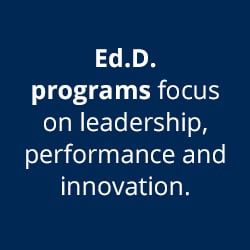
The Doctor of Education (Ed.D.) and the Doctor of Philosophy (Ph.D.) are more similar than they are different. Both are terminal degrees, signifying the highest level of education one can attain in an academic field. Students in each type of program complete a dissertation, a long-form research and writing project that demonstrates mastery of a chosen subject.
Both degrees also offer a rigorous, immersive learning experience and each qualifies graduates to teach at the university level. However, there are several key distinctions that students should consider in choosing a program:
- Most Ph.D. programs have a strong academic research focus. Students usually spend more time studying pedagogy and education theory, and doing original research, than engaging in direct educational practice outside of the university setting. One reason is because Ph.D. programs emphasize scholarship, preparing students to become authorities in their academic field. Graduates frequently go on to college teaching and research careers, or higher-ed administration.
- Most Ed.D. programs have a strong focus on applied learning. Students usually spend more time studying leadership, performance, decision-making and problem-solving than doing academic research. One reason is that Ed.D. programs emphasize challenges and solutions in practice, and research that encompasses education and other industries. Graduates frequently go on to top administration careers in education, or to lead organizations in the public or private sector.
What Types of Courses Will I Take in an Online Ed.D. Program in Educational Leadership?

Ed.D. coursework often begins with learning or leadership theory, to give students a solid foundation in the core concepts that they'll build on during their program. Concentration classes and electives also help students gain management and analytical skills they can apply in any workplace.
Students in STU's online Ed.D. in Educational Leadership – Administration program complete 20 courses, covering essential knowledge, specialized topics, research methods and dissertation work. You'll study:
- Leadership
- Management strategy
- Innovation
- Globalization
- Qualitative/quantitative research
- Information management
- Crisis and change management
- Performance management
- Governance
- Ethics
- Public policy
- Consulting
The program's integrated dissertation gives students the opportunity to begin working on this important part of doctoral study right away, from the very first course. Writing and researching in stages helps students manage the process effectively and stay on track to graduation. You can even defend your dissertation online.

—Joe Hogan, graduate, STU online Ed.D. in Educational Leadership – Administration program

—Scott Gill-Jacobson, graduate, STU online Ed.D. in Educational Leadership – Administration program


—Jose Quezada, graduate, STU online Ed.D. in Educational Leadership – Administration program
What Is a Dissertation?

A dissertation is a substantial writing project doctoral students complete as part of earning their degree. It gives Ed.D. students the opportunity to test leadership and management theories they are learning and develop their own original research on a subject of interest.
The goal is to contribute new knowledge to an academic field or industry. Ed.D. students may also discuss specific challenges in their current profession, propose solutions or even launch the next big idea for improving organizational growth or efficiency.
Work on the dissertation begins with a research question or topic the student wants to explore. After reviewing previous research and discussion on the subject, students write a proposal to introduce their question and demonstrate its relevance to their field. Once the proposal is accepted by a dissertation committee, work on the project begins.
Spotlight: Benefits of an Integrated Dissertation
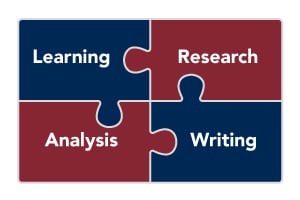
In traditional doctoral programs, students must complete all required coursework and pass qualifying exams before submitting a dissertation proposal. Some Ed.D. programs following this model also require students to demonstrate competency in a foreign language or meet other requirements before they can advance to the proposal stage. There is an alternative to this lengthy and complicated process.
Ed.D. programs with an integrated dissertation offer students a different path to the degree, and a graduate school experience that seamlessly incorporates learning, research and writing. This option also gives working students a faster and more flexible way to complete this important aspect of doctoral study.
An integrated dissertation is just as academically rigorous as a standard dissertation, but you can submit your proposal and begin writing much earlier, often during your first year. It may also help you stay engaged with the process and move at a steady pace. Many Ed.D. students find they can finish their integrated dissertation soon after their doctoral coursework is complete, which considerably shortens the time required to earn the degree.
STU's online Ed.D. in Educational Leadership and – Administration program enables students to fast-track their education with an integrated dissertation and earn a doctorate in as few as 36 months.

—Gabe Venturi, graduate, STU online Ed.D. in Educational Leadership – Administration program


—Ayodele William Okesola, graduate, STU online Ed.D. in Educational Leadership – Administration program
How Long Is a Dissertation?
Dissertation length can vary by topic and academic discipline, as well as program requirements. Each student's writing and research is unique, so your professors will help you decide what fits your project best.
Students often compare dissertation writing to working on a book about their subject. This is a good way to think about the process. Ideas are organized and presented in chapters, and students compose three to five on average. Dissertations can also vary in format, and may include audio or video, surveys, case studies, interviews, images or other elements in addition to your original writing.
Some integrated dissertations include a portfolio of conference papers or journal articles the student has published as well, or research projects. This also provides a comprehensive picture of the doctoral candidate's knowledge and contribution to their professional field.
How Does the Dissertation Committee Work? Do I Choose Professors or Do They Choose Me?

The dissertation committee is a group of faculty members with expertise in one or more areas of the student's research. Doctoral students typically ask three or four professors to serve on their committee, based on the type of knowledge or assistance each can provide. Some Ed.D. programs also recommend professors based on the student's career field or research goals.
The committee's role is to:
- Evaluate and approve the dissertation proposal
- Oversee all work on the dissertation
- Provide ongoing feedback and advice
- Pose questions during the dissertation defense
- Evaluate and approve the completed dissertation
As you write your dissertation, you will consult with faculty members on your committee for guidance. Once you complete the project, you'll meet with the full committee to discuss it and answer questions about your research findings. This meeting is referred to as the dissertation defense, and it's the final step in earning your doctorate.

—Dr. Shirley Sims-Gibbs, graduate, STU online Ed.D. in Educational Leadership – Administration program

—Jose Quezada, graduate, STU online Ed.D. in Educational Leadership – Administration program

Do I Need a Master's in Education or Teaching Experience to Apply to Ed.D. Programs?
It depends on the type of Ed.D. program you're interested in. Those focused exclusively on K-12 education may require an M.Ed. for admission as well as teacher or administrator certification. Programs designed for students with diverse professional experience, who may also be pursuing career goals outside of education, don't generally require an M.Ed. or background in teaching.
What Are the Admission Requirements for Ed.D. Programs in Educational Leadership?
Admission criteria varies by program, but requirements can include the following:
- Master's degree from an accredited institution
- Graduate GPA that meets the Ed.D. program's standards
- Official transcripts
- One or more recommendation letters
- Resume or curriculum vitae
- Statement of purpose or personal essay
- GRE or MAT scores that meet the program’s standard
St. Thomas University's online Ed.D. in Educational Leadership – Administration program features a streamlined admissions process. Requirements include a completed application, an accredited master's degree, a 2.6 GPA and official transcripts detailing all previous graduate and undergraduate work. No teaching experience, test scores or further documentation is needed.
Applicants with a second master's degree may petition for up to 18 hours of transfer credit (six courses), pending STU evaluation and approval.

—Ayodele William Okesola, graduate, STU online Ed.D. in Educational Leadership – Administration program

—Indira Munroe-Farrington, graduate, STU online Ed.D. in Educational Leadership – Administration program

Are Online Ed.D. Degrees Accredited?

Most universities offering online Ed.D. programs are accredited, which helps ensure that curriculum, faculty qualifications and student resources meet the highest standards. Accreditation also indicates that an institution offers students a quality education and that its programs have acceptable graduation rates.
St. Thomas University is regionally accredited by the Southern Association of Colleges and Schools Commission on Colleges (SACSCOC) and committed to helping students meet their personal and career goals and through education.
How Does Accreditation Benefit Doctoral Students?
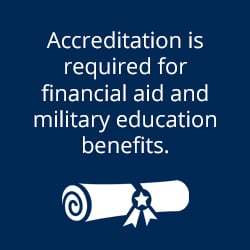
When you consider the following facts about accreditation, it's clear why Ed.D. students and graduates benefit from earning an accredited degree.
- Federal financial aid and military education benefits are not available to students enrolled in unaccredited schools and programs.
- Government-sponsored loan repayment, consolidation and forgiveness programs are only open to borrowers who studied at an accredited institution.
- Employers offering tuition reimbursement for doctoral courses usually require enrollment in an accredited college or university.
Holding an accredited Ed.D. also indicates to potential employers that your education meets the right professional standards for the job you want.
What's the Career Outlook for Ed.D. in Educational Leadership Graduates?

Graduates with this degree are prepared for a diverse range of leadership roles, including opportunities in K-12 and higher education, business, public service and consulting.
Demand for leaders with a creative approach to problem-solving is particularly strong in fields such as healthcare and technology, and in places where those industries are booming. In 2022, trade publication Business Facilities ranked the following states among the top in the nation for related economic development and innovation.
| State | Cybersecurity Industry | Aerospace & Defense Leaders | Biosciences Leaders | Healthcare Jobs | Solar Power Jobs |
|---|---|---|---|---|---|
| California | ✓ | ✓ | ✓ | ✓ | ✓ |
| Florida | ✓ | ✓ | ✓ | ✓ | |
| Georgia | ✓ | ✓ | |||
| Illinois | ✓ | ✓ | |||
| Maryland | ✓ | ||||
| New York | ✓ | ✓ | ✓ | ✓ | |
| Texas | ✓ | ✓ | ✓ | ✓ | ✓ |
Data from labor market research firm Lightcast also reveals that in some states, open jobs for executives and administrators with a doctorate far exceed the number of qualified candidates available.
| Occupational Category | States | Job Demange Percentage Above National Average |
|---|---|---|
| Healthcare Administration |
Texas | 120% |
| Business Management and Operations |
New York | 90% |
| California | 80% | |
| Education
Administration |
New York | 50% |
Source: Lightcast, October 2022

—Indira Munroe-Farrington, graduate, STU online Ed.D. in Educational Leadership – Administration program

—Dr. Shirley Sims-Gibbs, graduate, STU online Ed.D. in Educational Leadership – Administration program


—Scott Gill-Jacobson, graduate, STU online Ed.D. in Educational Leadership – Administration program
Do K-12 Teachers and Administrators Earn More With an Ed.D.?

Many K-12 teachers and principals see a pay increase in their current role after earning a doctorate based on an additional salary step or stipend for the degree. District policies dictate the type and amount you may receive.
If your goal in earning an Ed.D. is to advance your career, a doctorate can also help you develop the skill set required for top leadership jobs that come with higher salaries. Below are some examples of campus and district roles for qualified Ed.D. graduates moving up the education career ladder. This table demonstrates the pay range you may find by position and location.
| Position | District | Location | Average Salary |
|---|---|---|---|
| Director of Curriculum, Instruction and Innovation | Frederick County Public Schools | Frederick, MD | $183,550 |
| Executive Director, Early Childhood Education | Los Angeles Unified School District | Los Angeles, CA | $175,560 |
| Chief Academic Officer | School District of Lee County | Fort Meyers, FL | $158,256 |
| Assistant Superintendent, Instructional Technology | Atlanta Public Schools | Atlanta, GA | $149,678 |
| Director, Research Assessment and Accountability | Garland Independent School District | Garland, TX | $136,050 |
| Assistant Director of Operations | Arlington Heights High School District 214 | Arlington Heights, IL | $124,175 |
Source: Published school district salary schedules for 2022-2023
What Are Some Business Career Options With an Ed.D. in Educational Leadership?

Ed.D. in Educational Leadership students can develop a variety of potential career paths in business, whether they bring prior experience to their studies or transition to corporate life. Many move into management or executive positions after earning a doctorate.
Graduates can find success overseeing human resources, employee training and talent development programs. Ed.D. preparation can lead to lucrative consulting jobs as well, since cross-functional knowledge of education, policy and organizational dynamics helps many types of businesses succeed.
The table below features a few examples of high-paying jobs for Ed.D. graduates among a vast range of opportunities for leaders with this versatile degree.
| Position | Average Salary |
|---|---|
| Vice President of Government Affairs | $129,170 |
| Director of Innovation | $124,877 |
| Chief Learning Officer | $121,225 |
| Director of Change Management | $117,451 |
| Senior Human Resources Manager | $103,159 |
| Senior Organizational Development Consultant | $98,718 |
Source: ZipRecruiter, October 2022
Spotlight: Salaries for Higher Ed Administrators and College Professors

According to 2022 estimates from the U.S. Bureau of Labor Statistics, the median annual salary for post-secondary administrators at colleges and universities is $98,180. Median annual pay for administrators at smaller schools such as junior colleges is $94,120.
Institution-level leaders earn the top administrative pay, followed by those overseeing academic schools and programs. For instance, an Ed.D. graduate serving as a provost will usually make more than a departmental dean with the same degree. Tenured professors working for large research universities sometimes earn a better salary than high-ranking administrators at small colleges, simply due to the fact that big institutions have better access to funding and resources.
Pay for most college teaching positions will differ by school and subject area, but instructors working with graduate students may earn more. Salaries for full-time professors can vary by state as well, as demonstrated in the table below. Figures are based on regional data published annually by the American Association of University Professors (AAUP).
| State | Average Annual Salary | ||
|---|---|---|---|
| Assistant Professor |
Associate Professor |
Full Professor |
|
| California | $94,115 | $108,491 | $159,361 |
| New York | $87,469 | $103,340 | $155,007 |
| Texas | $86,914 | $95,366 | $137,823 |
| Florida | $83,476 | $93,543 | $137,079 |
Source: AAUP Faculty Compensation Survey, 2022

—Dr. Shirley Sims-Gibbs, graduate, STU online Ed.D. in Educational Leadership – Administration program


—Irene Okwang, graduate, STU online Ed.D. in Educational Leadership – Administration program

—Delorean Hogan, graduate, STU online Ed.D. in Educational Leadership – Administration program

What Are Some High-Paying Government and Nonprofit Jobs for Ed.D. Graduates?

Ed.D. graduates hold leadership roles in many different areas of public service. You'll find them running federal government projects, planning and directing local services, overseeing state agency budgets and performing policy analysis. Graduates working for nonprofit or non-governmental organizations can also serve as executive directors, development officers, program managers, grant writers or in positions overseeing direct services.
The table below features some high-paying public service jobs for Ed.D. graduates, along with the average salary for each.
| Position | Average Salary |
|---|---|
| Emergency Preparedness Manager | $130,539 |
| Chief Program Officer | $118,669 |
| Chief Administrative Officer | $108,920 |
| Senior Director of Public Policy | $102,003 |
| Senior Major Gifts Office | $99,856 |
| Proposal Manager | $96,177 |
Source: ZipRecruiter, October 2022
How Much Does an Online Ed.D. In Educational Leadership Cost?

It depends on a program's tuition and fee rate, as well as the number of credit hours required to earn the degree. Most doctoral programs in education require around 60 credits, and the following examples from Florida illustrate both high and typical costs.
Doctoral students in the state pay around $800 per credit on average for Ed.D. classes in educational leadership. A few private universities charge as much as $1000-$1500 per credit, however. And while some public universities offer a lower tuition rate, there's sometimes a catch. At one of the state's largest, the per credit savings is offset by the fact Ed.D. students must complete 90 credit hours to earn the degree. At another, out-of-state doctoral students pay almost three times the tuition and fees that their in-state peers do, even if they study online.
Some Ed.D. programs in Florida require participation in a summer institute or residency as well, which adds additional costs. All of these issues demonstrate why research is required to determine what you'll actually pay and find the right fit for your needs.
Students can complete STU's Ed.D. in Educational Leadership – Administration program in 60 credit hours and 100% online. No extra residencies or on-campus visits are required. Every student pays the same affordable tuition rate of $800 per credit hour, fees included and regardless of state residency. That means you can have the quality of a private university education for the same or lower cost than many public universities.
Can I Get Student Financial Aid for an Online Ed.D.?
Doctoral students can qualify for financial aid whether they study online or on campus. You must be enrolled in an accredited program or institution and submit the Free Application for Federal Student Aid (FAFSA) to apply. Eligibility is determined by your income, program cost and other factors. Visit the U.S. Department of Education to learn more.
Can I Use Military Tuition Benefits for an Online Ed.D. Program?

Yes. You should be able to use your military benefits to pay for an Ed.D. in educational leadership program as long as the college or university you select is accredited. Visit the U.S Department of Veterans Affairs website for information about applying for benefits and available funding.
Most colleges and universities that serve military affiliated students also help with certifying education benefits. The Veteran Services office at STU has VA certifying officials ready to assist you with all aspects of the process. You can even transfer benefits to your eligible spouse or children.
Can I Earn My Ed.D. in Educational Leadership and Still Work Full Time?

Yes! Many full-time educators and other professionals accomplish this goal each year, often by learning online. Accelerated doctoral programs with 100% online courses are designed for convenience and flexibility. They're also a great option for graduate students who happen to be parents, or those who need to study part time.
Earning your degree online gives you 24-hour access to all class materials and the ability to choose when and where you study. Since professors are available via video chat, it's easier to schedule discussions and meetings around your work routine as well. Assignment deadlines are weekly in online doctoral classes, which also gives students the chance to plan for their specific needs and circumstances.

—Indira Munroe-Farrington, graduate, STU online Ed.D. in Educational Leadership – Administration program


—Jim Coughlin, graduate, STU online Ed.D. in Educational Leadership – Administration program
How Quickly Can I Earn an Ed.D. Online?
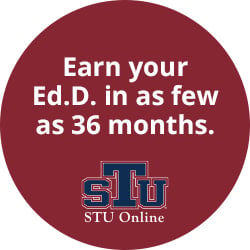
Traditional doctoral programs in education vary in length, but most are designed for five years of full-time study. Online Ed.D. programs help students compress that timeline by completing shorter courses at a faster pace. Students who enroll consistently can often earn their doctorate online in around three years. Part-time students and others who want to move at their own speed may graduate on a different schedule.
Most core and research courses in STU's online Ed.D. in Educational Leadership – Administration program are seven weeks in length. With accelerated, year-round classes and the program's integrated dissertation, it's possible to earn your doctorate in as few as 36 months.
What Should I Expect in Online Ed.D. Courses?

Online Ed.D. courses are both challenging and rewarding, just like doctoral courses on campus. The basic requirements and content are usually the same in both formats as well. Each professor will provide a class syllabus that outlines assignments and deadlines, but when you complete the work you'll upload it to your course. You will also spend time viewing video lectures and posting to class discussion boards, and interactions with professors and classmates will often happen via video chat.
Because most online classes are accelerated, students can also complete learning modules quickly and master new subjects in half the time they might in a traditional on-campus course.

—Delorean Hogan, graduate, STU online Ed.D. in Educational Leadership – Administration program


—Joe Hogan, graduate, STU online Ed.D. in Educational Leadership – Administration program
What Technology Do I Need for Online Graduate Courses?

A computer and internet are required, and you'll want to check your streaming speed. If you can watch videos without an issue and upload/download files reasonably fast, that's a great start.
You'll also need a webcam and microphone, as well as software you can use to write papers and create presentations. Make sure you have enough free space for large files as well. Cloud or drive storage can also work for that purpose. Some assignments can even be completed on your smartphone or tablet if needed, like watching video lectures or posting to the class discussion board.
Whether your preference is using a laptop, desktop computer or another device, it's a good idea to test your technology setup by logging into your online courses before your first term begins. Check with your Ed.D. program for any additional tech requirements you may need to be aware of as well.
How Do Students Connect in an Online Doctoral Program?

Online Ed.D. students often get to know each other through discussions, collaborations and group assignments that are part of graduate study. Progressing through a doctoral program and seeing the same classmates in different courses along the way offers students a chance to bond during the experience, just as they might with peers in an on-campus Ed.D. program.
You can make connections that support your personal and professional growth and keep the conversation going through group chats and on social media. Even if you live in different areas of the country, it's easy to stay in touch.

—Dr. Cory Los Schumacher, graduate, STU online Ed.D. in Educational Leadership – Administration program


—Jim Coughlin, graduate, STU online Ed.D. in Educational Leadership – Administration program
Can Online Students Access Library or Tech Support Services?
Yes. Online students usually enjoy many of the same services as students on campus. This includes remote library access and tech support.
STU's University Library offers a range of services that include access to its digital collection of books, journals and more. Online Ed.D. students can get research and citation assistance from librarians and even interlibrary loans. If you live more than 100 miles from campus, STU offers book delivery via USPS. Students can check-out print titles for up to 30 days.
STU's Office of Information Technology provides 24-hour tech support via phone, email and live chat.
Request Information
Submit this form, and an Enrollment Specialist will contact you to answer your questions.
By submitting this form, I am providing my digital signature agreeing that St. Thomas University (STU) and its agent, Risepoint, may email me or contact me regarding educational services by telephone and/or text message utilizing automated technology or a pre-recorded message at the telephone number(s) provided above. I understand this consent is not a condition to attend STU or to purchase any other goods or services. Privacy Policy. SMS Terms.